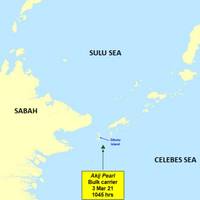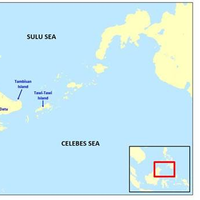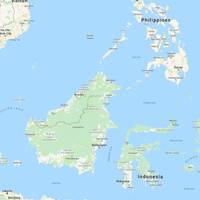Bulk Carrier Reports Attempted Attack off the Philippines

A Bangladeshi flagged bulk carrier was approached by suspected attackers off the coast of the Philippines on Wednesday.The ReCAAP ISC said it received information from the Philippine Coast Guard about the incident involving Akij Pearl off Sibutu Island, Tawi-Tawi, Philippines.While the bulk carrier was underway, an unidentified speed boat with three perpetrators on board attempted to board the ship at about 10:45 a.m. local time on Wednesday. The master reported the incident to the Philippine Navy Littoral Monitoring Station (LMS).
Warning: Abduction of Crew From Fishing Boat Off Malaysia

Name and Type of Ship: Fishing boatDate/Time of incident: September 23, 2019 at about 1200 hrs (local time)Area Description: Off Lahad Datu, Sabah, MalaysiaCategory: Abduction of crewDescription: On Sep 23, 2019 at about 1200 hrs, seven masked-men armed with high powered firearms such as M16, RPG and pistols; believed to be members of the Kidnap for Ransom Group (KFRG) in Sulu-based Abu Sayyaf Group (ASG) abducted three Indonesian crew from a Malaysian fishing boat. The fishing boat was in the vicinity waters of Tambisan Island…
New Guidance on Abduction in Sulu-Celebes Seas
The ReCAAP ISC has produced the “Guidance on Abduction of Crew in the Sulu-Celebes Seas and Waters off Eastern Sabah”.The guidance focuses on the incidents of abduction of crew from ships for ransom in the Sulu-Celebes Seas and in the waters off Eastern Sabah. It provides the guidance and analysis based on the information collected from past incidents in order to assist the shipping industry and ships to enhance their situation awareness and avoid such incidents.This guidance complements the general guidance contained in the “Regional Guide to Counter Piracy and Armed Robbery against Ships in Asia”The Sulu-Celebes Seas region covers the tri-boundary area of the Philippines, Malaysia and Indonesia.
Piracy Warning off Philippines

The ReCAAP ISC has received information from the Philippine Focal Point (Philippine Coast Guard) that a group of approximately 10 ASG (Abu Sayyaf Group) members armed with pistol, rifles and grenade launcher is planning to conduct kidnapping activities at any opportune time in undisclosed areas in Sabah primarily targeting businessmen or ship's crew of foreign vessels passing through the area. They are using unmarked colored blue and white motorbanca locally known as jungkong.
Two Vietnamese Sailors Beheaded by Abu Sayyaf
The Abu Sayyaf group beheaded two Vietnamese nationals held hostage for almost eight months, CNN reported quoting the military. Colonel Juvymax Uy, commander of Joint Task Force Basilan, said the bodies of Mr Hoang Trung Thong and Mr Hoang Va Hai were found at 5.40am on Wednesday in Tumahubong village, Sumisip town, in Basilan province. The two were among the six crew members of the MV Royal 16, a Vietnamese cargo vessel, seized by the Abu Sayyaf off Sibago Island in Basilan on Nov 11, 2016. The Abu Sayyaf is a group of ruthless bandits known to behead their hostages unless ransom payments are made. Abu Sayyaf, originally a loose network of Islamic militants formed in the 1990s with seed money from Osama bin Laden's Al-Qaeda network…
Philippines: Japan Offers Anti-Piracy Help
Japan has offered to send patrol ships to deal with a growing piracy threat in the southern Philippine waters bordering Indonesia and Malaysia, a senior Philippine defence official said on Tuesday. A surge in piracy off parts of the southern Philippines is forcing ship-owners to divert vessels through other waters, pushing up costs and shipping times. Dozens of sailors have been taken captive by Abu Sayyaf. Japanese vice minister Ro Manabe offered the assistance at a meeting in Tokyo on Friday and expressed readiness to contribute to efforts by the Philippines, Malaysia and Indonesia "in addressing piracy and terrorism", said Raymund Quilop, assistant defence minister for assessments and international affairs.
Shippers Avoid New "pirate hotspot" west of Philippines
Piracy has surged in Sulu, Celebes Seas; waters part of route carrying iron ore to Asia. A surge in piracy to the west of the Philippines is forcing shipowners to divert vessels through other waters, stoking their costs and extending the time it takes to transport goods such as Australian iron ore to key Asian destinations. There have been 16 attacks since last March on ships in the Sulu and Celebes Seas, through which about $40 billion worth of cargo passes each year, according to the Regional Cooperation Agreement on Combating Piracy and Armed Robbery against Ships in Asia (ReCAAP). That government-backed anti-piracy organisation says over a dozen crew are currently being held hostage by Filipino Abu Sayyaf militants, all from ships sailing through the Sulu and Celebes Seas.
Islamist militants free Korean, Filipino from cargo ship
Islamist militants in the Philippines allied with Islamic State freed on Saturday a South Korean cargo ship captain and a Filipino member of his crew held captive for more than three months on a southern island, an army spokesman said. Park Chulhong, skipper of the South Korea-registered carrier DongBang Giant 2, and Filipino Glenn Alindajao, were brought to the house of the island's governor after they were released by the militants of the Abu Sayyaf group, Major Filemon Tan said. Members of a Muslim rebel faction cooperating with the government in the south of the predominantly Christian country had helped arrange the release, Tan told reporters.
Pirates Attacking Bigger Ships off Philippines
Attacks in waters east of Philippines shift to big ships; ReCAAP, security groups recommend avoiding Sulu and Celebes Seas. Asian pirates are focusing more of their attacks on larger merchant ships near the Philippines, hoping for bigger ransom payments from kidnapping their crew, the head of a regional anti-piracy body said on Friday. The region's pirates have changed tactics since October, to target some of the biggest ships travelling through the Sulu and Celebes Seas, and paying less attention to small tugs and fishing boats. The growing problem has prompted Indonesia, Malaysia and the Philippines to step up air and sea patrols in the waters, through which about $40 billion worth of cargo passes each year.
Sulu Sea Kidnappings a Threat to Shipping - IMB
The Sulu Sea between eastern Malaysia and the Philippines has become dangerous for merchant shipping due to rising threat of kidnappings, the International Maritime Bureau (IMB) said on Tuesday. The Sulu archipelago is a stronghold of the Abu Sayyaf, an al-Qaeda linked group notorious for kidnappings and, increasingly, piracy. The IMB report was released just hours after armed men attacked a fishing boat, killing eight fishermen, in what appeared to be a pirate attack off the southern Philippines. IMB said global sea kidnappings rose three-fold in 2016, even as global piracy hit its lowest level in nearly 20 years. Pirates kidnapped 62 people for ransom in 15 separate incidents in 2016.
Pirates Attack in Philippine south Leaves 8 Dead
Armed men killed eight fishermen in what appeared to be an attack by pirates in dangerous waters in the southern Philippines, a coast guard spokesman said on Tuesday. The apparent act of piracy came as Philippine soldiers were given a six-month deadline to end Islamist militant threats, including those made on cargo ships in south, where a long-festering insurgency has been exacerbated by the growing influence of the Islamic State militant group. About two dozen sailors and tourists were taken captive by Islamist militants last year in attacks on tug boats and yachts in the Celebes and Sulu seas, raising concerns among defence officials from Indonesia, Malaysia and the Philippines about Islamist militancy and piracy.
Dryad Expands VSM Service to Sulu Sea
With vessels and crew having become a recent target by the militant jihadist group Abu Sayyaf in the Sulu Sea, it has now become an area of high risk for mariners. Dryad is therefore expanding its Vessel Safety Monitoring (VSM) service to the Sulu Sea. Managed from our 24-hour Operations Centre by experienced mariners and intelligence analysts, this service continuously tracks clients’ vessels and delivers the most up to date intelligence picture to Masters and shore teams on the latest emerging threats in the area. To minimise disruption to planned routes, dynamic routing advice will also be offered to Masters so that they can avoid the current location of assailants if deemed necessary to ensure the safety of the vessel.
Indonesia Maritime Threat Assessment
Militant group Abu Sayyaf (ASG) has conducted frequent kidnap for ransom attacks in the Sulu and Celebes Seas since March 2016, says a report by Protection Vessels International Ltd. Islamic State-affiliated ASG has successfully extracted millions of dollars' worth of ransom payments for individual releases and has decapitated several hostages when ransom demands have not been met. In November, ASG shifted towards targeting commercial vessels and successfully abducted six crew members from a bulk carrier. Armed robberies have grown increasingly violent in Indonesian waters in 2016 with robbers assaulting crew members who attempt to stop them.
Indonesia to resume coal shipments to Philippines amid piracy concerns
Indonesia will resume some shipments of coal to the Philippines, a government official said on Sunday, after a months-long halt due to concerns about piracy in seas between the two archipelagos. Indonesia earlier this year slapped a moratorium on coal shipments to its neighbour after a string of hijackings by militants based in the southern Philippines, in which several Indonesian sailors were taken hostage. Only ships with a capacity of over 500 tonnes will be allowed to resume sailing while smaller vessels and tugboats are still banned. "For safety and security reasons ... all ships must sail in the recommended corridors and avoid conflict areas or waters (around) the southern Philippines and east Malaysia," Transportation Ministry official Tonny Budiono said.
Crew Kidnapping Persists Despite Piracy Slowdown -Report
Despite a decline of piracy activity in several high-risk areas, a high threat of crew kidnapping and hijacking remains in Southeast Asia and West Africa, according to a recent report from specialist crisis prevention and response consultancy NYA International. Overall piracy activity in the third quarter of 2016 declined in global hotspots compared to the previous quarter, as Southeast Asia and the East Africa and Indian Ocean High Risk Area (HRA) both saw drops in reported piracy incidents, and West Africa notably experienced a drop in severe incidents such as attacks and hijackings, according to NYA’s Q3 2016 Piracy Assessment. In West Africa, piracy activity in Q3 2016 declined in severity compared to the previous quarter, when 16 attacks and nine hijackings were reported.
Philippines, Indonesia Sign Maritime Accord
The Philippines and Indonesia have agreed to join forces in combating crime on the high seas, after a surge of kidnappings by Abu Sayyaf bandits in waters between the two countries. Philippines President Rodrigo R. Duterte and Indonesian President Joko Widodo had signed an agreement to ensure maritime security in the region and affirming both countries’ commitment to fight terrorism and illegal drugs. Philippines President gave Indonesian forces the right to pursue pirates into Philippine waters, saying piracy is one of the main problems between the two countries. “We agreed on the implementation of a cooperative framework to address security issues,” Duterte and Widodo said in a joint press statement.
Jakarta to Boost Security of Small Vessels
Jakarta will boost security of small vessels after hijackings 15 July, says a report in Protection Vessels International Ltd (PVI). Indonesia is currently discussing with the International Maritime Organisation the rules for deployment of naval and coast guard vessels to escort small vessels delivering traded goods between Indonesia, Malaysia and the Philippines, after a series of hijackings in the Sulu and Celebes seas by Abu Sayyaf group (ASG) pirates. Jakarta will also coordinate with ship-owners and coal mining associations to urge vessels to take safe routes away from areas known to have a large pirate presence. ASG has kidnapped tens of Indonesian and Malaysian seamen from small vessels since March in a bid to raise funds through ransom, says PVI Analysis.
Philippines, Malaysia, Indonesia Mull Joint Maritime Patrols
Indonesia, Malaysia, and the Philippines have agreed to conduct coordinated maritime patrols as part of a broader plan to tackle rising security challenges in the waters bordering the three countries, report local media. This plan was sent in a joint statement following the trilateral meeting among Philippines' National Defense Secretary Voltaire Gazmin, Malaysia Defense Minister Dato’ Seri Hishammuddin Tun Hussein and Indonesia Defense Minister Ryamizard Ryacudu in Manila. They also agreed in principle to have the armed forces of the three countries exercise greater coordination in conducting relevant security and maritime activities. During the meeting, the three officials discussed the recent incidents of kidnappings and armed robbery at sea in common maritime areas.
Piracy: Indonesia Could be the New Somalia
Commercial ships have been told to avoid shipping routes around Indonesia and Philippines amid fears that piracy could be reaching Somalian levels, according to Reuters. A spate of kidnappings and pirate attacks in the waterways between Indonesia, Malaysia and the Philippines has prompted the three countries to explore the option of having joint patrols. The waters form part of major shipping arteries that carry US$40 billion worth of cargo a year, analysts say, and the corridor is used by fully laden supertankers from the Indian Ocean that cannot use the crowded Malacca Strait waterway. A total of 18 Indonesians and Malaysians have been taken captive in three separate attacks on tugboats in Philippine waters along the route…
Philippines: Coordinated Patrols Needed to Protect Shipping
The Philippines has been discussing coordinated naval patrols on its southern maritime borders with Indonesia and Malaysia to protect shipping after attacks and kidnappings by Islamist militants, its foreign minister said on Thursday. Indonesia is trying to free about 14 of its citizens seized from tugboats by Abu Sayyaf rebels from the southern Philippines and has called for joint patrols. Four Malaysians seamen are also being held. The Islamist rebels, who are raking in tens of millions of dollars in ransom, decapitated a Canadian on Monday and are still holding 23 hostages. Citizens of the Netherlands, Japan, Norway and the Philippines are among them.
Islamic Militants Free Indonesian Sailors
Ten Indonesian tugboat crewmen held by the Abu Sayyaf terror gang in the southern Philippines were freed unharmed Sunday. The sailors arrived in Jakarta late on Sunday night, hours after they were released from captivity. They arrived at Halim Perdanakusuma Airport, East Jakarta, at 11:30 p.m. on Sunday using Jet Victoria News aircraft. Indonesia paid no ransom to free the sailors taken hostage, with efforts relying on negotiations, the lead Indonesian negotiator claimed on Monday. They were welcomed by Foreign Minister Retno Marsudi and the National Armed Forces Chief General Gatot Nurmantyo. “All crew members will be taken to hospital for medical examination,” Retno said Sunday, May 1, 2016 before adding that the victims would be returned to their family after the examination.
East Asia Trio Agree to Boost Maritime Security
Foreign ministers and defense force chiefs from Indonesia, Malaysia and the Philippines signed a joint declaration on maritime security on Thursday, calling on all governments in the region to increase efforts to tackle marine threats, reports Jakarta Post. The three officials hashed out details of joint patrols, including issues on how the exchange of information would take place between the three countries. The leaders called for intensified maritime security following the recent kidnapping of seamen by the Southern Philippines-based Abu Sayyaf militant group, and other armed sea robberies, that have endangered national security in the region. - set up a hotline of communication among the three countries to better facilitate coordination during emergency situations and security threats.
Southeast Asian Nations Designate Safe Shipping Corridor
Indonesia, Malaysia and the Philippines on Monday agreed to designate a transit corridor for commercial vessels crossing a maritime zone hit by a spate of hijackings by Islamist militants in the southern Philippines. Nearly 20 Indonesian and Malaysian tugboat crew have been kidnapped by the Abu Sayyaf militants this year, with Jakarta airing fears that the problem could reach levels seen off the coast of Somalia. Alarmed at the frequency of attacks, port authorities in some areas of Indonesia, particularly Kalimantan on the island of Borneo, have stopped issuing permits to ships taking coal to the southern Philippines. Indonesia is the world's largest thermal coal exporter and supplies 70 percent of the Philippines' coal imports.







